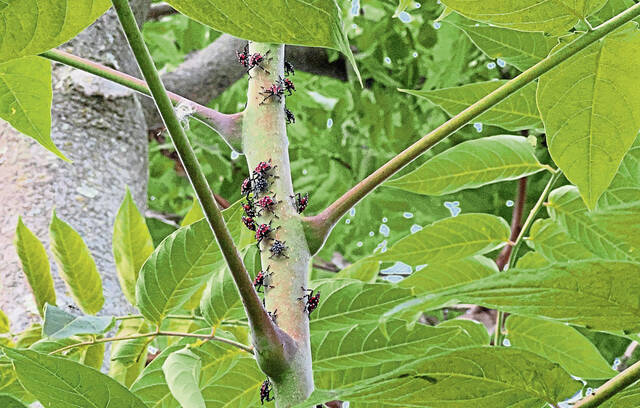https://staging.triblive.com/news/pennsylvania/freeze-thaw-cycle-impacts-laternflies-not-so-much-ticks/
Fewer lanternflies this summer? Maybe, and you can thank this week’s deep freeze

One upside to the frigid cold — there should be fewer pesky spotted lanternflies this summer.
The mottled, brilliant red and white plant hoppers lay eggs inside a sac that clings to trees and resembles a bag of baked beans, but some of those sacs likely will not survive this week’s deep freeze, said Zach Lipniskis, operations manager for D-Bug Pest Control Inc. in Unity.
Spotted lanternflies are native to Asia. They invaded the Americas about a decade ago and inundated Western Pennsylvania the past few years.
They don’t weather the cold well because they lack a hard shell for protection that helps other insects during the winter, Lipniskis said.
Other insects, including ticks that carry several diseases, can survive cold spells better. They hibernate in burrows beneath leaves on the ground or other composting material or in the barks of trees, Lipniskis said.
“It’s not going to reduce population (of ticks) that much” because they are dormant and can get shelter, Lipniskis said.
Extreme cold is less harmful to insects than varying temperatures, said Michael Skvarla, assistant research professor of arthropod identification at Penn State’s entomology department.
Mild winters with fluctuating temperatures may mean fewer insects in general, but continuously cold winters mean they stay hibernating throughout the season, Skvarla said.
Insects that live in Western Pennsylvania are accustomed to the quirks of the weather here, Skvarla said.
When it gets warmer than usual in the winter, the insects can emerge from being dormant too early.
“If they wake up too many times and there’s no food available because of winter, that can kill them,” Skvarla said.
With bugs hibernating in the winter, D-Bug employees won’t begin spraying for pests until the last week of March, typically after temperatures rise above freezing at night, Lipniskis said.
Copyright ©2026— Trib Total Media, LLC (TribLIVE.com)
